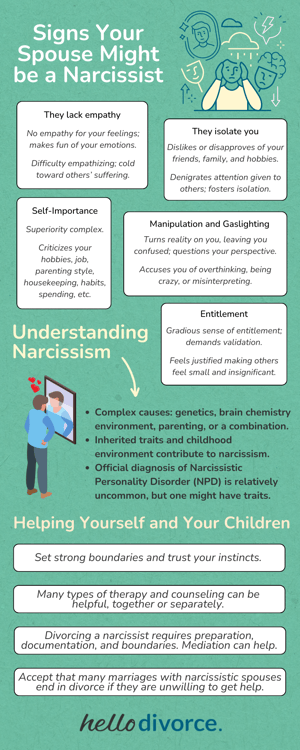Signs Your Spouse Might be a Narcissist

- Could my spouse be a narcissist?
- Signs of narcissism in a marriage
- Narcissistic traits vs. NPD
- How parental narcissism affects children
- Why does my spouse act this way?
- Can narcissism be passed down genetically?
- Narcissistic abuse syndrome
- Helping yourself and your children
- Step-by-step guide to setting boundaries with a narcissistic spouse
- Divorcing a narcissistic spouse
- References
Do you feel like you’re walking on eggshells and constantly defending yourself in your marriage? Do you feel controlled and diminished on a daily basis? Do you sometimes question what you’re feeling and even question your own sanity?
Is it possible that your spouse may be a narcissist?
What are the signs of narcissistic behavior, does your spouse exhibit them, and what can you do to protect yourself from their emotional abuse?
Could my spouse be a narcissist?
Even though the term “narcissist” has crept into our common vocabulary, an official diagnosis of narcissistic personality disorder, or NPD, is still relatively uncommon. The DSM-5 sets out criteria for a clinical diagnosis of NPD, but you don’t need a diagnosis to know that life with your spouse feels “off.” Your spouse may be a narcissist or, at the very least, manipulative and controlling in a narcissistic way.
Narcissistic behavior doesn’t necessarily make your spouse a bad person. On the contrary, it may stem back to their childhood and the way they were treated or conditioned. They may have been brought up to believe they had to be “more” to get the attention they needed as children. Or, their parents may have habituated them to believe they were more special and deserving than everyone else. 
Regardless of the how or why, your spouse’s behavior has become a huge issue in your relationship. They belittle you and always put their needs first. Ask for your opinion? They just don’t seem to care. You weigh everything you say and do, and yet nothing is “right.”
You may have tried to explain how their behavior makes you feel. But that may have just made it worse, prompting them to flip the conversation against you. “Why are you always so sensitive?” they may ask. “Can’t you take a joke?”
Let’s take a deep dive into narcissistic behavior and possible ways you can deal with it.
Signs of narcissism in a marriage
In a healthy marriage, your spouse should be the one person you trust beyond measure. And yet, you may feel unsure what to believe when they tell you something. When you question something they say, your spouse may accuse you of overthinking or being neurotic. You may feel like you’re constantly (yet subtly) being put down or painted into a corner, and the only way to get out is to give in.
What behaviors exist in a marriage with a narcissist? There are some red flags that spouses with narcissistic behaviors often display.
Lack of empathy
They have no empathy for your feelings and make fun of you when you’re upset. In fact, they have difficulty empathizing with anyone and can be downright cold toward others who are suffering.
Self-importance
Your spouse may seem like they feel superior to everyone, including you and your kids. To them, everyone else is lacking in some way. Your spouse’s needs and opinions are more important than yours, and when you dare to voice yours, you’re diminished and made to feel stupid. They criticize your job, your parenting, your housekeeping, and your spending.
Isolation
They don’t like your friends, your family, or your hobbies and interests, and they denigrate any attention you give other people or interests. If you spend time on things other than your spouse and their needs, they do things to turn your attention back to them. For example, they might attempt to make you jealous or concerned about their whereabouts. Consequently, you feel increasingly isolated from the people and things you love.
Entitlement
Because of their feelings of vast superiority and grandiosity, they may seem to have a magnificent sense of entitlement, believing they deserve eternal validation and the best of everything. They also feel entitled to make everyone around them feel small and insignificant.
Manipulation and gaslighting
They turn reality on you. If you are upset about something, your spouse questions whether your perspective and feelings are based on reality. If you’re upset about something they did, they insist they were “just joking” or “never said that.” You are accused of overthinking, over-feeling, and even being a bit “crazy” for thinking and feeling the way you do.
Read: What is Gaslighting? How to Recognize This Bad Behavior in Your Relationship
Narcissistic traits vs. NPD
We often use the term narcissistic as a common adjective or put-down for anyone we perceive as self-consumed. But would that be considered narcissism, or NPD, by a clinician?
What we commonly refer to as narcissism is a set of selfish social behaviors that aren’t always rooted in an official diagnosis. And these behaviors come in shades of gray. In fact, in our society, positive self-esteem could be viewed as narcissistic … yet also healthy. So, when is it narcissism, and what is the difference between our common understanding of narcissism and official NPD?
A spectrum of traits
Clinicians view narcissism on a spectrum. At one end is the healthy version that can be seen in terms of balance and the greater good. On the other end is the pathological form of narcissism that can be harmful to the person and others around them. And some narcissistic traits fall in the “middle” in terms of severity.
The pathological form of narcissism is the one that typically gets the formal NPD diagnosis.
So, where does your spouse fall on the narcissism scale? When you’re being affected by these behaviors, you probably don’t care. You just want help.
How parental narcissism affects kids
Although signs of NPD typically show up in early adulthood, the roots of narcissistic traits usually begin far earlier. Studies show that people who exhibit poor self-esteem and narcissist traits are often parented by people with narcissistic traits of their own.
Narcissistic parents are often emotionally distant, neglectful, and even abusive. In their world, love must be earned. They maintain control by telling lies and distorting the truth. It’s no wonder this type of parenting can produce another generation of narcissists.
Here are some signs of narcissistic parenting.
- Their love is conditional. Kids of narcissists often blame themselves for their parents’ lack of unconditional love and satisfaction. They go on to think that all love is conditional.
- They gaslight their kids. Children of narcissists don’t know who or what to trust, and they learn that they can’t safely confide in their parents. They often second-guess themselves when things get confusing and even question their own sanity.
- They need all the attention. Children of narcissists often feel invisible, overlooked, and unheard, no matter how hard they try to get their parents’ positive attention.
- They neglect the needs and feelings of others, including their kids. Consequently, kids of narcissistic parents typically struggle with expressing themselves in healthy ways to get their needs met.
- They place blame on their children and rarely admit wrongdoing. Kids of narcissists can tend to deny the blame for any mistakes they make, chronically blaming others – like their children – instead.
Kids raised by narcissistic parents have endured a slew of toxic modeling. They can face a range of effects from it, from damage to their self-esteem to unhealthy ways of interacting with the world and others.
The result? They end up emulating the only role models they had – their parents – further perpetuating a damaging cycle.
Kids with narcissistic parents are constantly afraid of displeasing their parents and enduring their punishments.
Why does my spouse act this way?
When you got married, you thought you had struck gold. You found someone who adored you and was attentive and giving. Life was good, and you felt confident that nothing could shake your relationship.
But the shake-up came, and it came from within. Behind closed doors, their adulation turned into undermining your opinions and choices. Compliments turned into contradictions. Your spouse was the epitome of grace in public, but away from watchful eyes, they derided everything you said or did. You came to realize that their initial behavior was a facade.
True narcissism as a complex mental disorder hasn’t been well-studied. While nobody knows for sure what causes it, experts surmise that it can be caused by genetics, environment, parenting, or a confluence of these factors.
Learn to differentiate between an overt narcissist and a covert narcissist here.
Can narcissism be passed down genetically?
Studies suggest that some traits of narcissism seem to be inherited. While no specific “narcissism gene” has been identified, it’s widely accepted that NPD can be passed down through families.
This brings up the issue of nature vs. nurture. Growing up in a household with physical and emotional dysfunction, over-protectiveness, or narcissistic parenting can also set the stage for kids to develop the disorder. For some, narcissistic traits can develop as a defense mechanism to growing up with family shame and feelings of inadequacy. Others grow up being told they are special and shielded from any accountability for their actions or wrongdoing.
The childhood environment can also factor into someone developing narcissistic behaviors. A child who has grown up with trauma, is economically or socially disadvantaged, or has been repeatedly bullied by others can develop a defense of superiority as a consequence of being treated “less than” or belittled and criticized throughout their lives.
Something to understand: Narcissistic Abuse Syndrome
What is narcissistic abuse syndrome? While it isn’t formally recognized in the DSM-5, mental health professionals acknowledge and describe it as the psychological and emotional abuse experienced by someone who has been in a relationship with a narcissist.
If you’ve been in a marriage with someone with narcissistic traits, how do you know if you have narcissistic abuse syndrome? And if so, how can you get help?
Do you recognize these symptoms in yourself?
- You often doubt your own memory, sanity, reality, or judgment.
- You’re constantly tired, exhausted, and stressed with no medical reason.
- You have difficulty sleeping.
- You exhibit physical symptoms such as headaches, stomachaches, or other aches and pains with no medical reason.
- You no longer feel valuable.
- You’re afraid to make decisions on your own.
- You feel isolated from your family and friends, or your relationships with them have become strained.
- You avoid social situations in general.
- You feel worsening symptoms of depression and anxiety.
- You’ve become dependent on your abuser.
- You require constant approval and validation from your abuser.
- You avoid anything that might cause conflict or disapproval.
- You’re becoming more reliant on alcohol or drugs.
- You want to leave the relationship but are terrified of leaving or afraid you couldn’t survive without that person.
If you’ve been in a relationship with someone with narcissistic traits and recognize these symptoms in yourself, you may be suffering from narcissistic abuse syndrome.
Don’t wait. It's critical to get the help of a therapist who is experienced in working with narcissistic partners to help you recognize the control and emotional abuse you’ve been dealing with and help you rebuild your life, with or without your spouse.
Helping yourself and your children
If you’re married to a narcissistic spouse, it can feel unnerving, confusing, and downright isolating. While you may understand why your spouse is the way they are, it doesn’t take away from the fact that it has affected your relationship, your well-being, and your children’s well-being.
Can you successfully be married to and co-parent with someone with narcissistic traits? That depends. If your spouse recognizes that their behavior is harming your relationship and kids, many types of therapy can be helpful. But this means that your spouse has enough self-understanding and commitment to your relationship to want to fix what’s wrong.
In the meantime, take care of your own needs. Develop strong boundaries. (More on boundaries in a moment!) Trust your instincts, and know that what you’re feeling is real. You are not crazy; you have been the victim of narcissistic abuse. You are valuable and strong. If your spouse can’t recognize that, you deserve freedom from their emotional abuse.
Step-by-step guide to setting boundaries with a narcissistic spouse
How can you set boundaries with someone who is intent on manipulating and controlling you? It’s challenging at the very least, but it’s crucial for your emotional health, safety, and future.
Understand what you’re dealing with
It will be helpful to understand narcissism and all the ways a narcissist employs to control those around them. Educate yourself so you recognize the behaviors when they emerge. Know that these behaviors will go into overdrive the minute you begin to push back and set boundaries for yourself.
Identify your limits
Ask and answer questions such as, “What do I need to feel respected” and, “What will I no longer tolerate?” Be as specific and realistic as possible. When considering your limits, also consider your future. Is this marriage sustainable or even healthy? As long as your well-being continues to be compromised, the answer is probably a resounding “no.” It may be time to think about your options.
Communicate your needs clearly and unemotionally
Choose a time when there’s no tension or conflict already underlying the conversation. Instead of blame, use “I” phrasing. Be clear about what you need and what the consequences will be if they ignore your boundaries. Make sure these consequences are realistic.
Don’t get caught up in any manipulation tactics. State your case, and end the conversation. And then, follow through on what you’ve said. If a boundary is crossed, be prepared to implement the consequences swiftly and consistently, even if you’re facing resistance and manipulation. Consequences are meaningless if they aren’t enforced.
Don’t do this alone
Dealing with a narcissistic spouse can be grueling. It can help to build a support network of trusted friends and family who understand what you're going through. Consider getting professional help from a therapist who can support you in setting and maintaining your boundaries.
A note about safety: If there’s a chance that you’re at risk of physical harm, trying to set boundaries can throw your delicate balance off. Your safety is paramount. Create a safety plan, have a safe place to go, and take legal measures to ensure your protection.
Divorcing a narcissistic spouse
Many marriages with narcissistic spouses end up in divorce court. Divorcing a narcissistic spouse can come with its own challenges. They thrive on conflict, and their feelings of superiority and entitlement can result in unnecessary custody and financial battles. Under the pressure of a divorce, a narcissistic spouse’s unflappable and superior facade can crack and go into full-on manipulation tactics.
At Hello Divorce, we understand that some of our readers are ready to move on from an abusive relationship. We are here to help you through the process with divorce plans, services like divorce coaching and mediation, and informative resources. If you are married to a narcissist and are looking for a better life, let us help. Schedule a free 15-minute phone call for more information.
Need a lawyer for your divorce? We love Marble Law because they have experienced, flat-fee attorneys (no billable hours with surprise extra costs).
References
Narcissistic Personality Disorder. National Library of Medicine.The impact of parental narcissistic traits on self-esteem in adulthood. (2014). Smith College Works. Theses, Dissertations, and Projects.
A Behavioral Genetic Study of Intrapersonal and Interpersonal Dimensions of Narcissism. National Library of Medicine.



